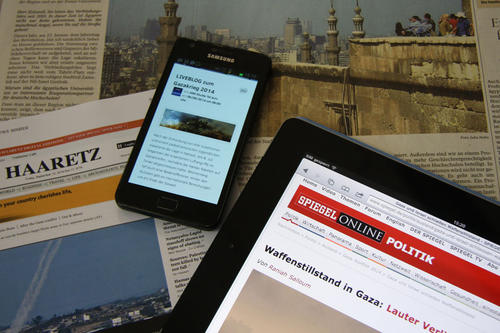Studying Freedom of the Press in Israel
"The Middle East Conflict and the Media": Students of Media and Communication Studies publish the results of their research in a compilation
Sep 12, 2014
How do journalists in Germany report on the Middle East conflict? How does this compare with reporting in Israel and the Palestinian territories? Students of Media and Communication Studies explored questions like these.
Image Credit: Verena Blindow
How do the media work in Israel and the Palestinian territories? How does the situation there look with regard to freedom of the press? How do journalists in Germany report on the Middle East conflict? The 30 participants in the master’s degree seminar “Media and Political Communication” at the Institute for Media and Communication Studies explored questions like these. Term papers from this course, which also included a trip to Israel and Palestine, have now been published in a compilation titled Der Nahostkonflikt und die Medien (The Middle East Conflict and the Media).
Ingo Dachwitz is one of the students who participated in the seminar and the field trip to Israel and the Palestinian territories. In the course headed by Carola Richter, Professor of International Communications at Freie Universität, Dachwitz and the other participants acquired specific expert knowledge regarding media work in the area while also gaining insight into the situation there.
The students wrote about what they had learned and their experiences. In lieu of a final exam, the course concluded with a 20-page term paper on a specific aspect of the subject. Some of the papers, which were written in groups or individually, have now been edited for a compilation titled The Middle East Conflict and the Media. The volume was published as a special issue of the Global Media Journal, which Richter edits.
Dachwitz is pleased that the students’ papers are not simply being shelved somewhere. He studied his topic, “Control of the Media in Israel,” together with one Chinese student and one Lithuanian one based on the experiences of Israeli journalists. “It was important to us to embed our studies in a fundamental context and find out what mechanisms of controlling the free expression of opinion are possible in the media systems of modern democracies,” Dachwitz says. Israel, he says, is an excellent example because of its constantly tense security situation.
Censorship Does Not Prevent Criticism
“On our trip, it was clear to us right from the start that we should not claim to know how freedom of the press works,” says Dachwitz, 26. Instead, he and his fellow students wanted to understand how the concept of freedom of the press works in Israel, and how journalists deal with the restrictions locally. “I was definitely surprised that a certain measure of censorship and self-monitoring was accepted and in some cases even advocated by many journalists,” Dachwitz says of his conversations with journalists. “The press there can still be very critical regardless, but in times of crisis it evidently deliberately scales back its criticism to avoid exacerbating existing conflicts.”
On the other hand, Dachwitz says, journalists carve out leeway for themselves within the scope of the restrictions. “The reporters we talked to stressed that censors do redact military-related information from articles, but not opinions or comments,” he says. Due to the Internet and global digital connectivity, he points out, it is simply impossible anyway to prevent all publications on certain subjects.
Media and Communication Scholars as Field Researchers
Carola Richter is “very happy” with her students’ work. She says she was pleasantly surprised to see that most of them were very interested in field research: “I think it’s great that they had the confidence to really tackle the subject.”
When it came to getting the papers into the proper form for publication, the seminar leader and students worked closely together. Dachwitz is also happy with the results, saying that it is “really great” to see what can become of a term paper after several rounds of editing and proofreading.
What the students gained from the master’s degree seminar is more than just an article in a well-known publication. Dachwitz says his view of the Israeli and Palestinian press landscape has also changed on a lasting basis. “Here in Germany, the media only report on the conflict in Israel when something else bad has happened,” he says, adding that there are hardly any reports on peace efforts and individual reconciliation strategies. “If you really want to be informed, you have to broaden your media spectrum, following both German and Israeli reporting. And that also includes reading blogs and social media,” Dachwitz says.
This text was originally published in German in campus.leben on September 12, 2014.
Further Information
Carola Richter (ed.): Der Nahostkonflikt und die Medien. (Global Media Journal, German Ed.; Vol. 4, Nr. 1 (2014); URL: www.globalmediajournal.de.) Paperback, 252 Seiten, 12,90 Euro. ISBN: 978-3-7357-3918-6.

